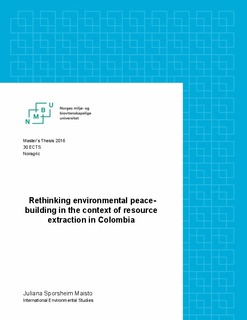| dc.description.abstract | In this thesis I seek to explain the links between the governance of resources and the peace process in Colombia. To meet this aim, I explore the role of civil society movements in struggles related to extractive projects in the country.
In a first section of the thesis, I explore how extractive operations tend to reinforce the previous dynamics of violence that inhibit the peace-building process, and explain that the government is purposively leaving out issues related to the extractive sector in the peace agreements. Secondly, I explain the role of civil society movements in contesting extractive projects and in advancing alternative paths for resource governance.
I argue, that in contrast to the official commitment for peace, the alternative agendas on resource governance advanced by civil society movements contribute to the construction of long-term peace in the country. The movements’ chief claims include principles of food sovereignty and popular participation. In the chosen case study, which I analyze in the second section of the thesis, I address precisely the significance of a mechanism for popular democracy called consulta popular, i.e. local referendum on mining, in relation to “La Colosa” gold mining project. In exploring the significance of consulta popular I shed light on the factors that contribute, or not, to its implementation and legitimization. I show that the organization around a consulta popular contains some internal frictions, but overall, it unifies the civil-society movements committed in the mobilizations against “La Colosa”. I also explain that state and industry actors oppose the application of consultas populares on mining in an authoritarian manner, through legislative changes and threats to individuals.
From my findings, I argue that the increased use of the democratic mechanism of consulta popular in Colombia in recent years, represents a local response to contrast the violence of extractive exploitation, and reflects civil society’s claims for enhanced social justice along the national process for peace. While the first section of the thesis relies mostly on secondary data, the second section is a result of four months fieldwork conducted in Colombia in 2015. Finally, a theoretical aim of this study is to further an encounter between the fields of resource governance and politics with peace and conflict studies. In particular, the study draws from these fields’ critical concepts, which give importance to issues of participation and to sub-national dynamics of governance, and places centrality to the concept of environmental peace-building. | nb_NO |
